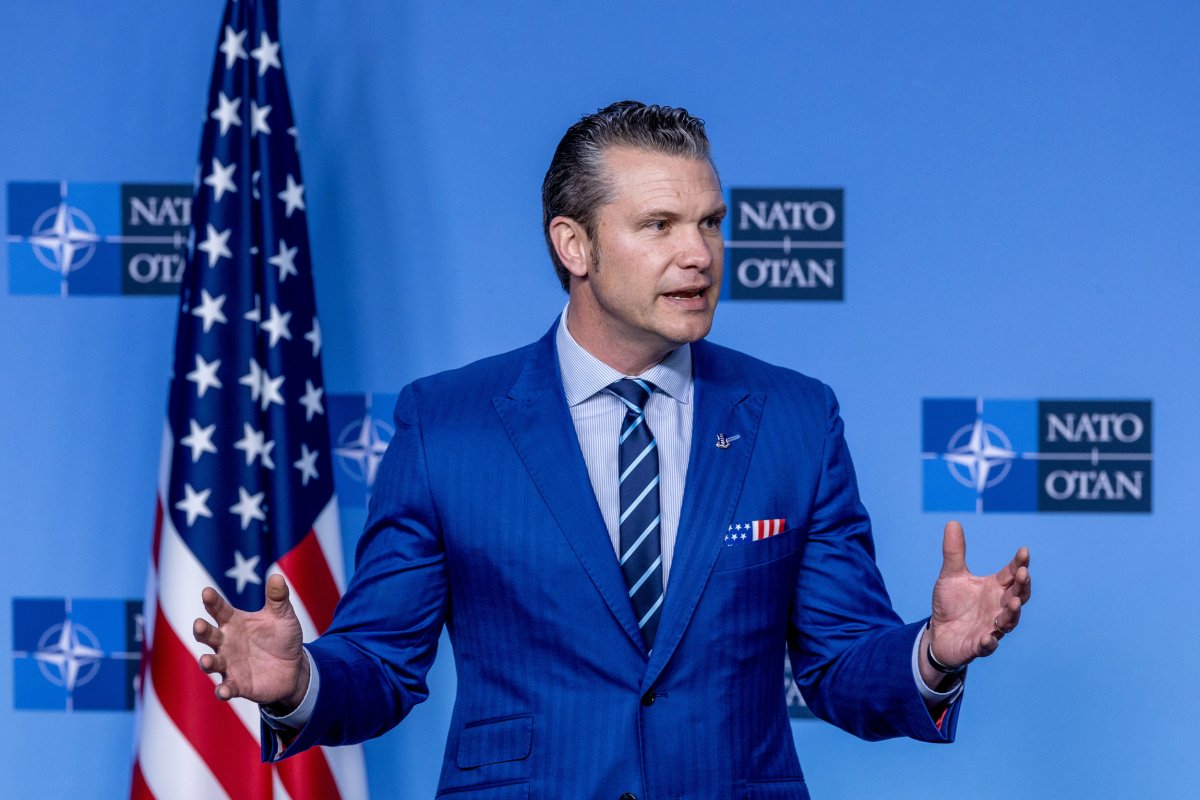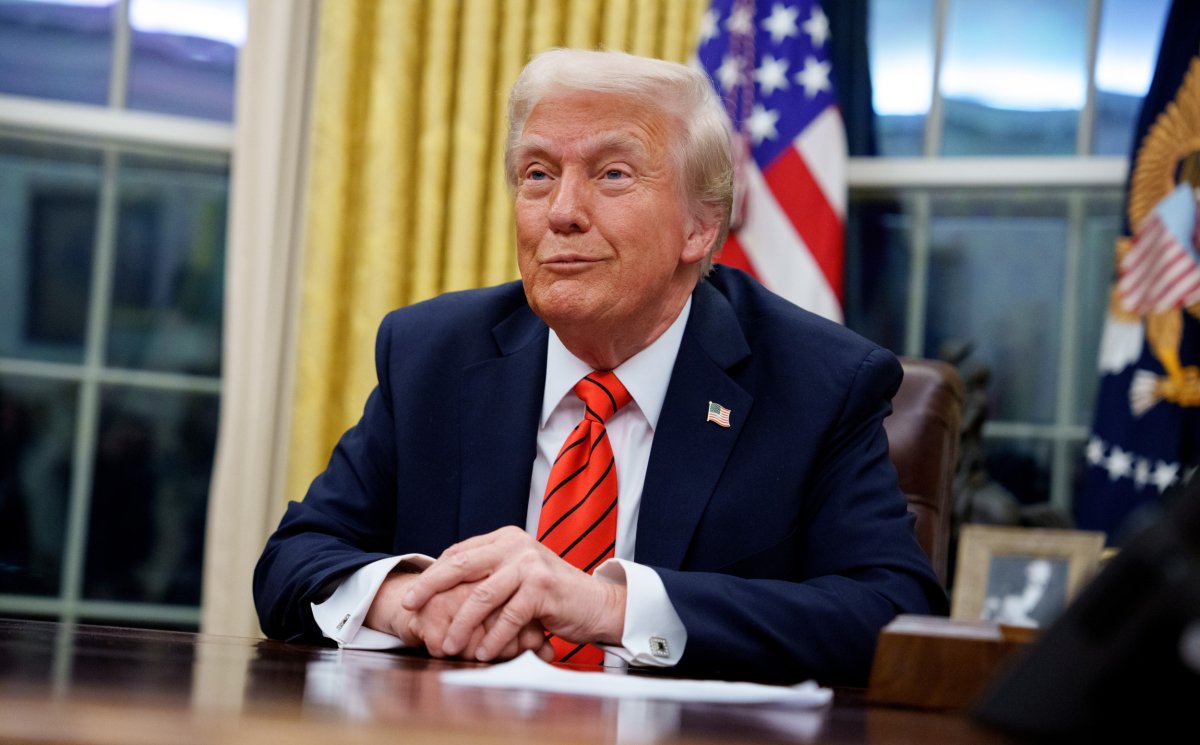-
Girlfriend serves only 2 years after fatally stabbing her boyfriend. Was it self-defense? - 8 mins ago
-
Remembering Pope Francis - 9 mins ago
-
Mets' Francisco Lindor knocks a lead off home run vs. Phillies - 13 mins ago
-
Gay Moms, Irish Catholics, and the Pope—a Story of Faith and Inclusion | Opinion - 18 mins ago
-
Arnold Schwarzenegger’s son turns heads with body transformation - 28 mins ago
-
Girlfriend serves only 2 years after fatally stabbing her boyfriend. Was it self-defense? - 51 mins ago
-
How to Watch the “Conclave” Movie Following the Death of Pope Francis - 57 mins ago
-
Vikings 7-round mock draft: How should Minnesota build around J.J. McCarthy? - 60 mins ago
-
Can Trump fire Federal Reserve Chair Jerome Powell? Here’s what to know. - about 1 hour ago
-
Dick Van Dyke gives rare comment about 46-year age gap with his wife - about 1 hour ago
Putin Won – Newsweek
On February 24, 2022, Russian President Vladimir Putin told his people why he was launching a full-scale invasion of Ukraine in what he called a “special military operation.”
“As NATO expands to the east, with every passing year, the situation for our country is getting worse and more dangerous,” he said in a televised address, immediately before his forces launched their assault.
“Moreover, in recent days the leadership of NATO has been openly talking about the need to speed up, and force the advancement of the alliance’s infrastructure to the borders of Russia. In other words, they are doubling down on their position. We can no longer just watch what is happening.”
After nearly three years of war—a war that has cost tens of thousands of lives on both sides—that aim now appears to have been fulfilled, and it is Ukraine that must stand and watch.
President Donald Trump said that he had agreed to talks with Putin, and he and Defense Secretary Pete Hegseth effectively rejected Ukraine’s chances of returning to pre-invasion borders or NATO membership.
As sidelined European leaders reeled in shock, the verdict from Carlo Masala, a professor at the Bundeswehr University of Munich, was clear. “Putin will have won this war from this point of view,” he told Bild.
That sentiment was largely echoed by analysts Newsweek spoke to. They described the news as a “discursive victory” for Russia and said it appeared the United States was acquiescing to Putin’s demands before negotiations had even begun.
The Kremlin hailed the talks as “historic,” and prominent Russian figures were jubilant.
Russian Senator Alexei Pushkov said the call between Trump and Putin “will go down in the history of world politics and diplomacy. I am sure that in Kyiv, Brussels, Paris and London they are now reading Trump’s lengthy statement on his conversation with Putin with horror and cannot believe their eyes.”
Meanwhile, the Russian stock market surged, and that hasn’t been the only good news for Putin. From his point of view, opposition at home has been quelled, sometimes murderously, and troublesome organizations such as the International Criminal Court, which issued an arrest warrant for Putin but is now facing U.S. sanctions, are in Trump’s crosshairs too.
Russia still has serious problems, notably its sanction-hit economy. But if Putin’s goal was to prevent a unified NATO nation being established at Russia’s border, that goal is, at the very least, close to being complete. Newsweek has contacted the Kremlin for comment.
Mikhail Svetlov/Getty Images
Ukraine’s Pre-2014 Borders
In a rambling, semi-historical essay, written in 2021 before the full-scale invasion and titled ‘On the Historical Unity of Russians and Ukrainians,’ Putin outlined what he saw as Russia’s claim over Crimea, as well as Donbas and Luhansk. “The anti-Russia project has been rejected by millions of Ukrainians. The people of Crimea and residents of Sevastopol made their historic choice,” he wrote in one section.
It appears that Hegseth agrees. He said that a return to Ukraine’s borders before 2014, when Putin annexed Crimea, was unrealistic. That year, Russian forces blindsided the West with their rapid takeover of the Ukrainian territory. Watching, apparently powerless, was then-Vice President Joe Biden and a team of advisers that included Antony Blinken, later his secretary of state.
Trump, who has said that Russia would never had launched its full-scale invasion had he been president, held separate phone calls with Putin and Ukrainian President Volodymyr Zelensky on Thursday announcing that negotiations would begin immediately and a ceasefire was imminent. This was widely seen as another indication that a return to Ukraine’s pre-2014 borders was off the table.
The previous day, Trump said he had direct engagement with the Russian president which Bloomberg reported had caught European officials off guard.

Omar Havana/Getty Images
No NATO Membership for Ukraine
Hegseth also said any peace deal must include security guarantees to ensure that the war will not restart, but Europe has to do more. He ruled out Ukraine joining NATO, a key demand of Putin.
Kira Rudik, leader of Ukraine’s liberal, pro-European Holos Party, told Newsweek Thursday that Hegseth’s comments showed the U.S. wants to move responsibility for Ukraine’s support onto Kyiv’s European partners.
But she said it was unclear whether Europe was ready to accept this responsibility and was concerned that support for Ukrainian troops would be interrupted.
Estonian politician Marko Mihkelson warned of “a dark day for Europe.”
Keir Giles,senior consulting fellow at Chatham House, said that Hegseth had ruled out credible security guarantees for Ukraine from the U.S. or NATO but any ceasefire would be brief and would give Russia breathing space to rebuild its land forces faster.
“The parallels with 1938 could only be clearer if Trump had held up a note and said Mr Putin had assured him he had no further territorial ambitions in Europe,” Giles told Newsweek, referring to British Prime Minister Neville Chamberlain’s appeasement of Hitler before World War Two.
Kirill Shamiev, policy fellow at the European Council on Foreign Relations, told Newsweek: “Make no mistake, Trump’s and the Kremlin’s messaging about the talks and the potential peace deal looks like a huge relief and discursive victory for Russia…from the Russian point of view, this is already a great PR victory.”
He added that Trump had ticked boxes such as shifting the blame for war to Biden.

Andrew Harnik/Getty Images
Russia’s Stock Market
As Russia’s sanctions-hit economy faces headwinds, Putin will be buoyed by a surge in Russia’s stock market on Thursday.
The Moscow Exchange (MOEX) and the RTS Index both jumped by more than six percent. The ruble, whose value had plummeted in recent months, has strengthened 3.72 percent against the U.S. dollar to 90.5.
Pekka Kallioniemi, creator of Vatnik Soup which analyses Russian disinformation, posted on X, formerly Twitter, that Trump’s call with Putin gave a massive boost to the Moscow stock market and that the U.S. president “is now saving the Kremlin from the brink of economic catastrophe.”
However, Putin still faces a turbulent economy, with inflation of 9.5 percent, which the central bank is trying to curb with a record key interest rate of 21 percent.
This has been fueled by Putin’s military spending and a worker shortage, exacerbated by huge casualties in Ukraine and a growing demographic crisis.
Meanwhile, U.S. sanctions by the previous Biden administration have added to the economy’s problems, with Russia’s sanctions-busting “shadow fleet” used to transport oil, posing further problems for exports of its revenue-generating energy resources.
No Opposition, the ICC and the White House
Sunday will be the first anniversary of the death of Alexei Navalny, the most prominent Russian opposition figure whom Putin has faced in his presidency. The Russian government was accused of being involved in his death by multiple Western nations, and there appears to be no sign of anyone with a similar profile taking up his mantle.
Putin will also be boosted by Trump’s move last month to sanction the International Criminal Court, which in 2022 issued an arrest warrant for the Russian leader.
Jeremy Pizzi, from Global Rights Compliance, which is helping Kyiv document Russian war crimes, told Newsweek that criminal sentencing for those accountable for Russia’s illegal actions in Ukraine as well as financial reparations were needed.
This was essential to ensure the end of Russia’s illegal advances and guarantee all Ukrainian territory gained since 2014 is returned, he said, or peace would be in name only.
Meanwhile, the U.S. Senate confirmed Tulsi Gabbard as director of national of national intelligence, following questions from Republicans and Democrats over her past comments that they said were sympathetic to Russia.
“This war and suffering could have easily been avoided if Biden Admin/Nato had simply acknowledged Russia’s legitimate security concerns,” she tweeted in 2022.
Gabbard has rejected claims that she had spread pro-Russian views, saying: “I don’t pay attention to Russian propaganda.”
Europe Sidelined
With a phone call, Trump has overturned years of U.S. policy on the war in Ukraine. But while the Kremlin has confirmed it has begun its planning for talks, Marie Dumoulin, director of the European Council on Foreign Relations’ wider Europe program, said it is not clear how the U.S. intends to pursue these negotiations.
Whatever happens, Putin appears to have the upper hand over his European rivals.
Dumoulin told Newsweek it is also not not known whether the U.S. intends to talk separately to Russia and Ukraine to bring them around one table, or whether other important stakeholders, including Europe, will play a role.
The Financial Times reported that European nations fear they will be left to shoulder the costs of post-war security and reconstruction in Ukraine as they remain excluded from U.S.-Russia talks.
“By excluding the prospect of NATO membership for Ukraine and by shifting the burden of future European security on Europeans, U.S. officials already have deprived themselves of important levers they could have used in a future negotiation, to push Russia into concessions,” Dumoulin said.
Source link
























